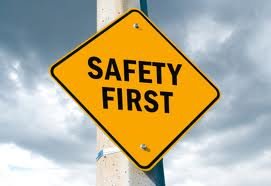I don’t usually talk much about my day job here but I work as a rehabilitation consultant, assisting people with injuries and disabilities get back to work. So when Nuffnang asked me if I would be interested in writing a post about Workplace Safety on behalf of WorkSafe, it was right up my alley. In the 20 years I have worked in the rehab field I have seen people who have sustained all manner of injuries from workplace accidents. People are most often injured when they are distracted or in a hurry.
Have you ever been in a work situation and have been asked to do something that you know is unsafe? Sometimes supervisors who are working to production deadlines will ask employees to take short cuts. It can be difficult to stand up to a supervisor and often workers will obey orders/instructions that they are given even if they know it is not safe. In a previous job when I was a uni student, I worked in a nursing home and even though we were supposed to use a hoist to lift/transfer patients, if the hoist was in another room, we were often asked to make do without it to save time – which I obeyed. In hindsight I took a big risk of developing a back injury.
In the 1960’s, Stanley Milgram conducted a series of experiments to show that people are obedient to requests, even if those requests were harmful to themselves or others. 60-70% of people tested were prepared to follow orders that involved harming others (via electrocution) if told to do so by an authority figure. You can see more about the experiment here:
WorkSafe recently conducted a similar experiment asking people on a busy street to pick up a live wire and pass it to someone. Amazingly, 90% of people did what they were asked. You can check it out here:
Further research conducted by WorkSafe has shown that supervisors will often ask employees to do risky or dangerous acts in certain circumstances.
· 1 in 5 Supervisors would bypass safety to get a job completed more quickly
· 1 in 4 Supervisors would bypass safety if a $1000 performance bonus was at stake
· Supervisors rate keeping up production and meeting client deadlines ahead of safety.
The key message for supervisors is that people will take risks if you ask them – so don’t ask them. Be aware of your own safety and the safety of those you work with.
We condition our kids to listen/obey authority figures – teachers, coaches, employers etc . My teens have part time jobs in a supermarket and in a fast food outlet. Sometimes employers can take advantage of their young staff so I have shown my kids these youtube clips, and we have had a discussion about work safety, following your gut reaction, and not obeying supervisors if they ask you to do something unsafe. Fortunately both of their employers are safety conscious and the teens have done workplace safety induction courses.
Have you ever been in a situation where you were asked to so something by a supervisor that was unsafe?








Are you sitting down? I was once asked to use a CHAINSAW with NO safety gear and NO training! That was one time I said “no” to a supervisor. He knew I had no training, and thought he could bully me into it. By the way, I would have been working in the woods, alone.
I didn’t realize that’s what you do for a living. How interesting and rewarding! One of my college roommates has a similar occupation. I’ve spent most of my career at a desk job, so I don’t think I’ve ever felt unsafe or had to do something dangerous. But I used to have to carry really heavy legal files that I wished the guys would have helped with. (I was the only girl… doing a sort of “girl’s” job)
Luckily, I’ve always been a pigheaded worker! When in school our teachers gave us the same test as you are talking about here. Only two persons in a class of 25 refused. Guess who was one of them! Good job on the post. It is important to just say no.
The Milgram experiment has always fascinated me, but strangely, I never associated it with what some supervisors might request at work. (I always associated it with the willingness of soldiers and workers in places like concentration camps to follow orders.)
You’ve made an excellent point about people in authority asking people to do dangerous things without evil intention, but with a casual carelessness and lack of concern.
My husband died in a work accident 34 years ago, due to faulty equipment.
I don’t know if it is the same now, but it was common practise in those days, that, the government’s safety inspectors would call days in advance to let the company know, that, they were coming. The company then had time to slow down the machines, clean the place, and take other measures to make it appear as if the place was safe. When the inspectors arrived, they found everything in order, but as soon as they left, everything went back to the same fast pace.
I think, that, in order to the inspections to be effective, they have to be done by surprise, unannounced, only in this way, the companies, that, are violating safety regulations, can be stopped.
After an accident happens, monetary compensation, does not fill the emptiness left by the death of a loved one.
Canada
Wow, what an eye opener.
I worked in an office…software programmer. I had a career ending nerve injury. You don’t have to stand on ladders or use dangerous tools to get hurt.
Interesting, but very unexpected on your blog.
This is interesting – my son is in grade 7 and got into trouble last week because he stood up to a teacher at school that was bullying another student. Connor asked the teacher to apologise to the other student for making him cry and instead got into trouble himself and has since been punished by the school. It’s a fine line between standing up for what you believe in and standing by so you don’t get into trouble yourself.
I have seen tragic deaths of people from their respective work over the years. It’s sad to think that they are making a living for their family, but it would also be the one to take their lives away. Workplace safety is important and should be followed by companies.
Work areas should always provide a safety working environment to their employees. And as mentioned in this post, an employee should never be asked to do anything risky by their supervisors no matter what the situation is.